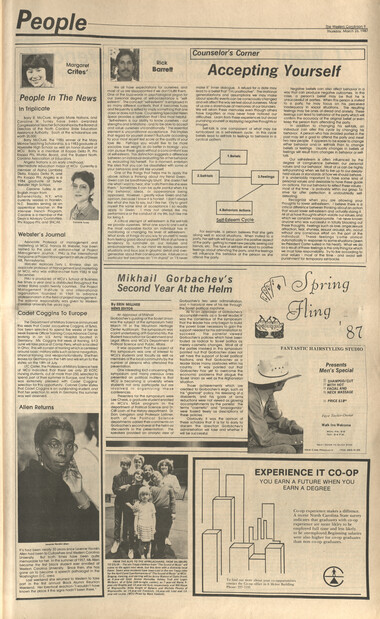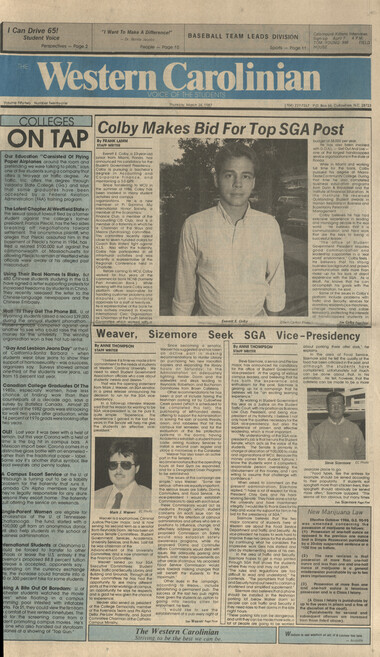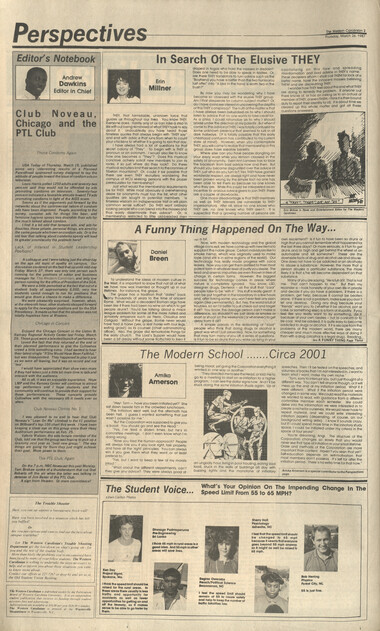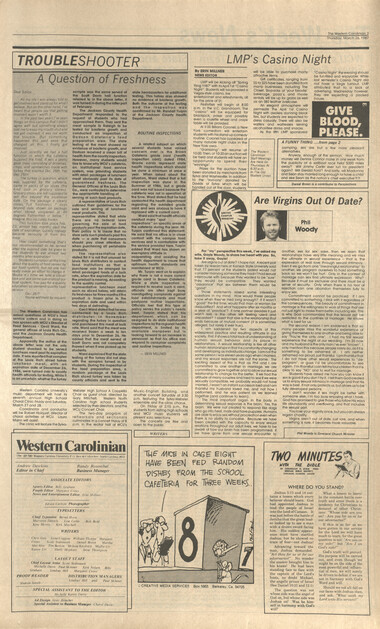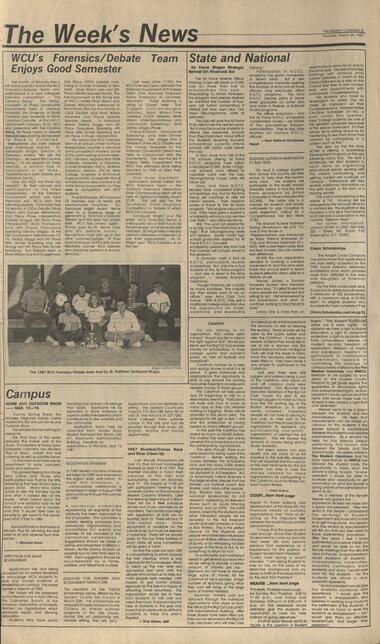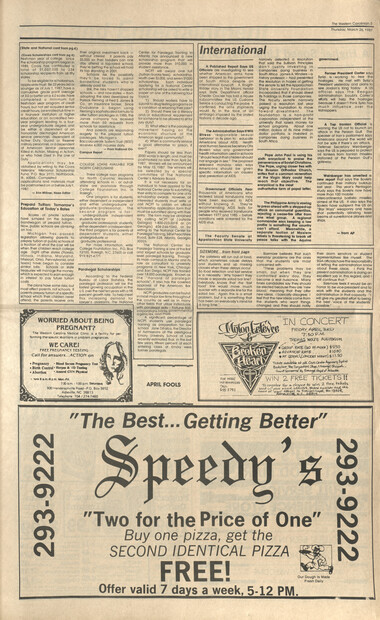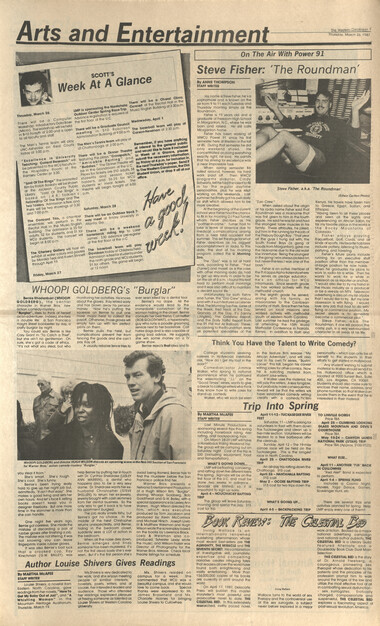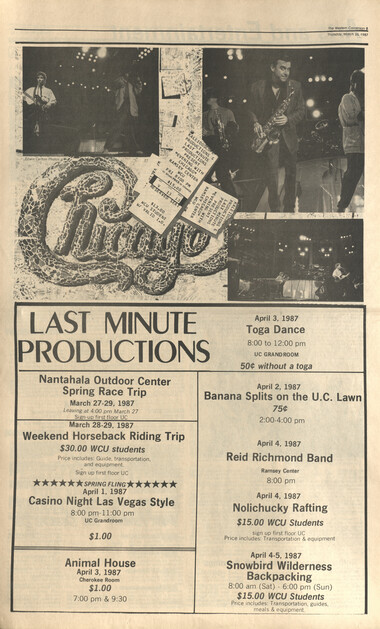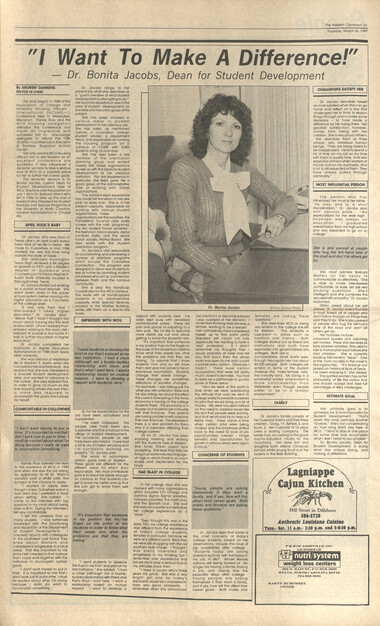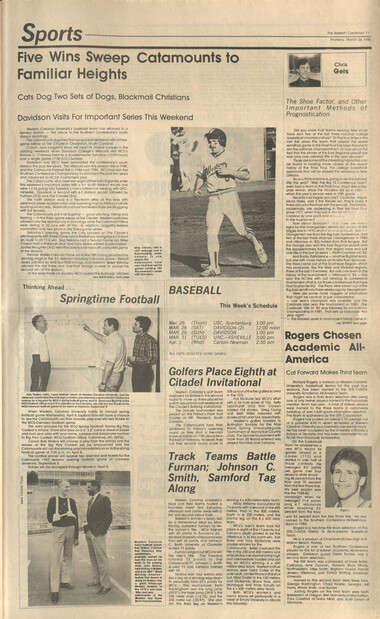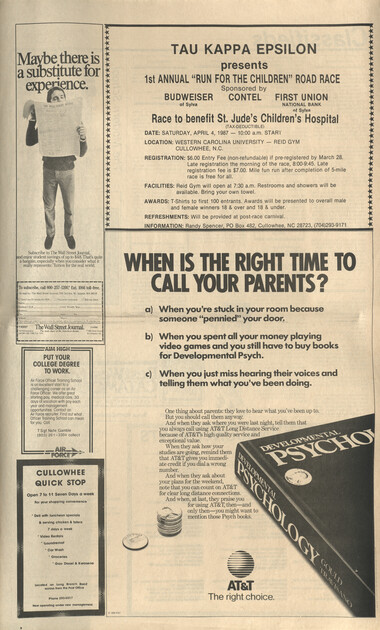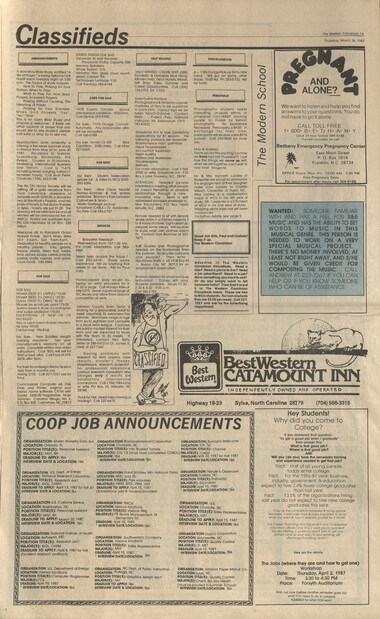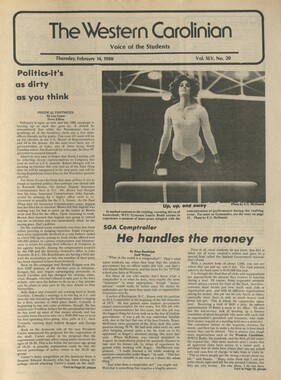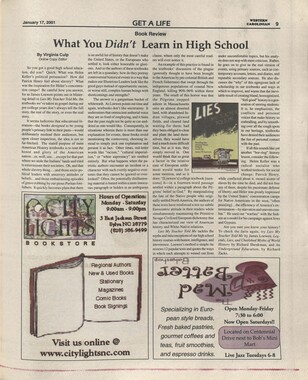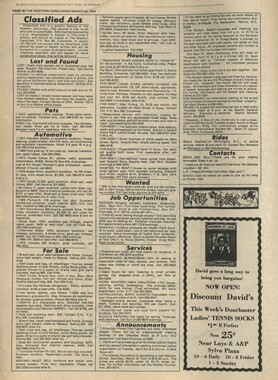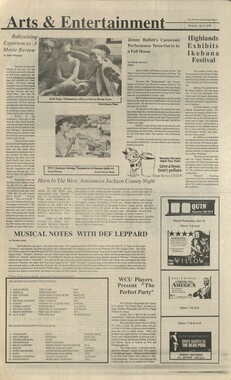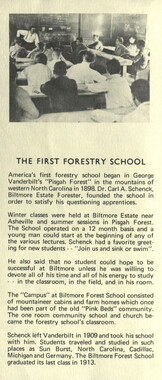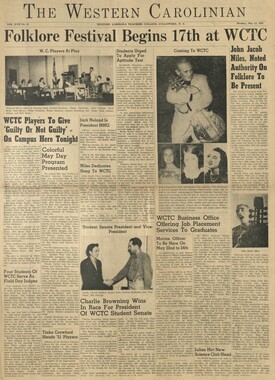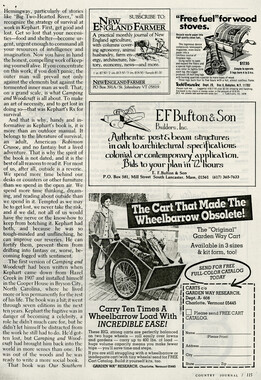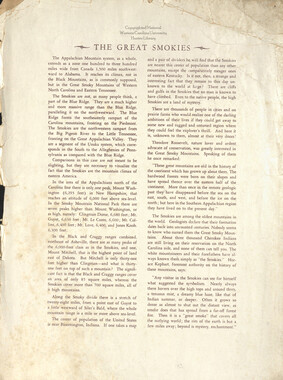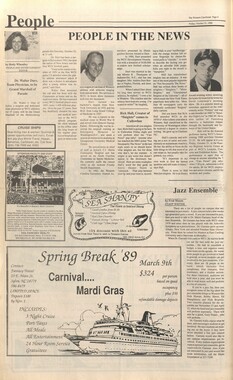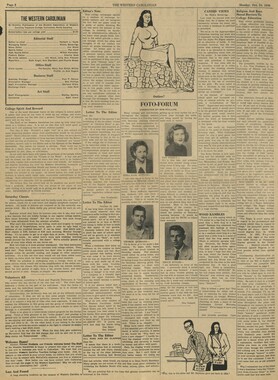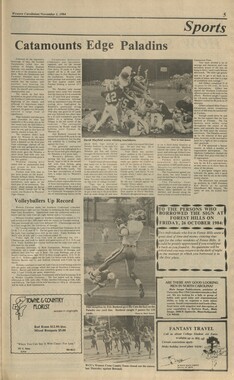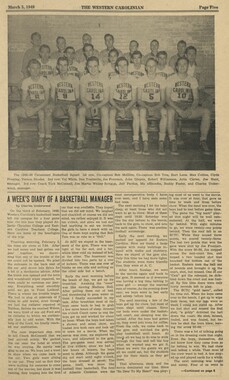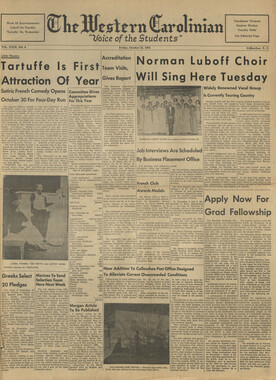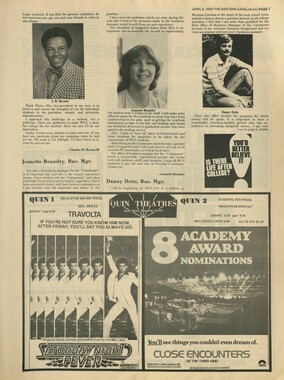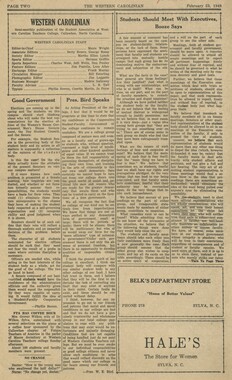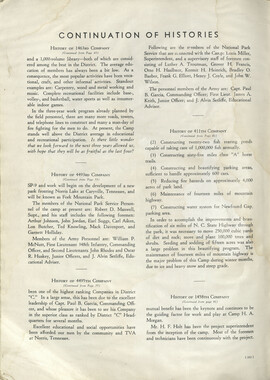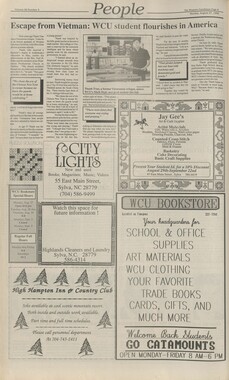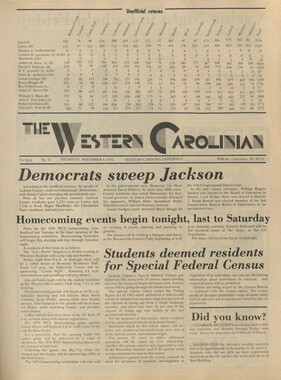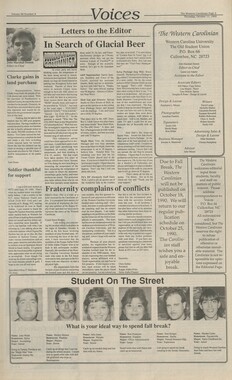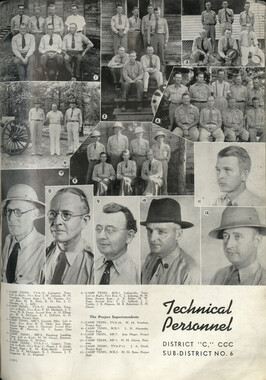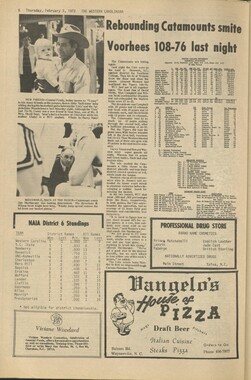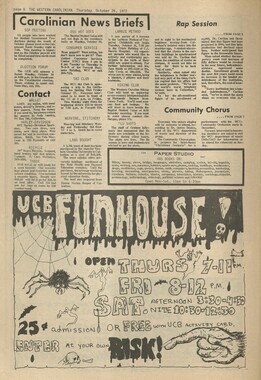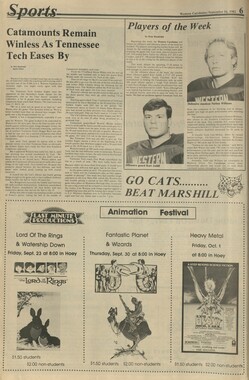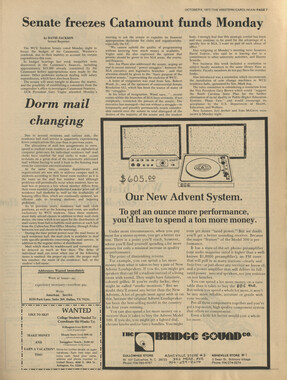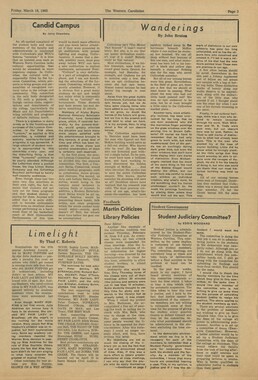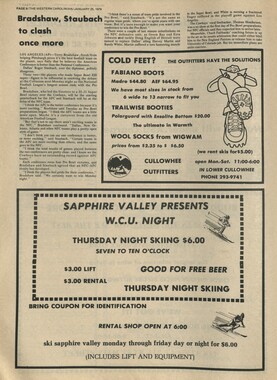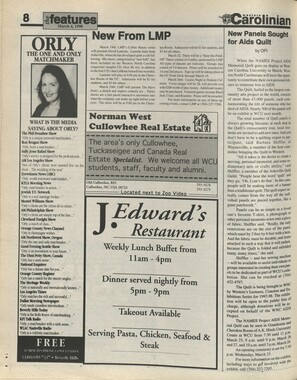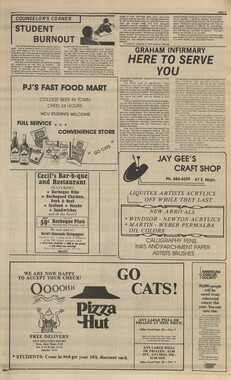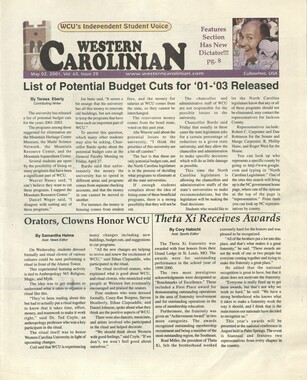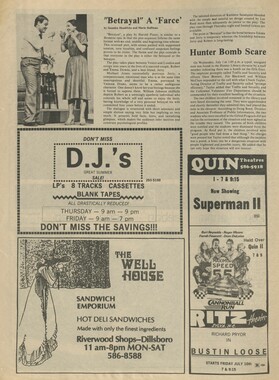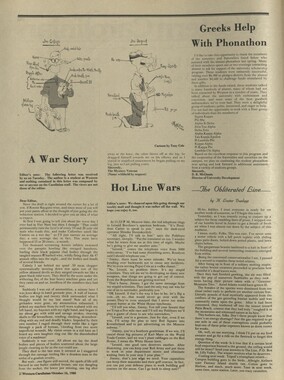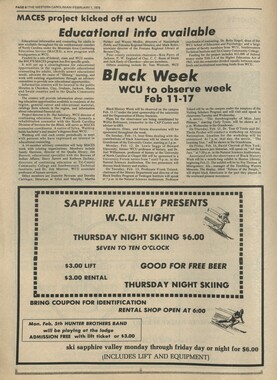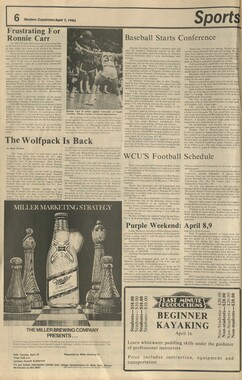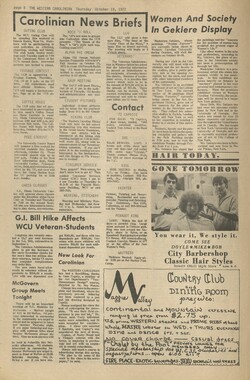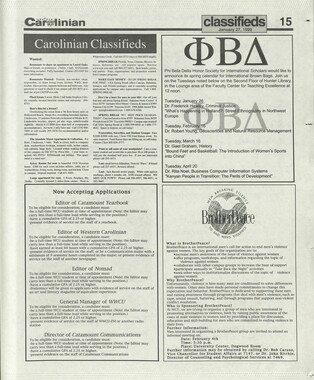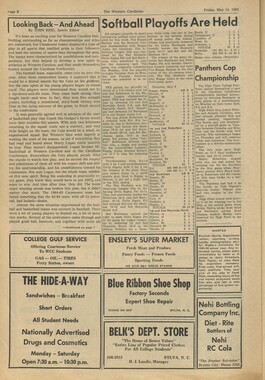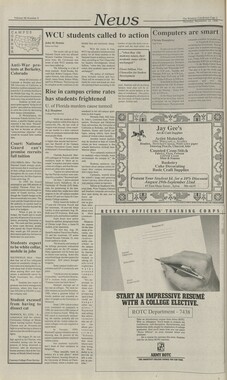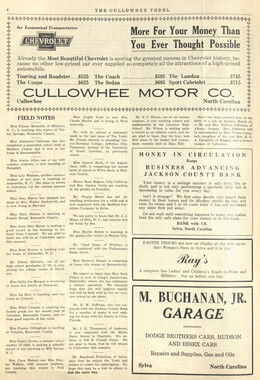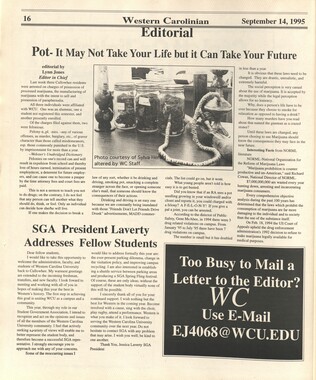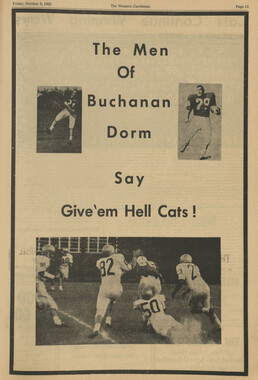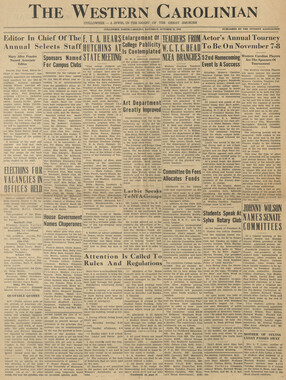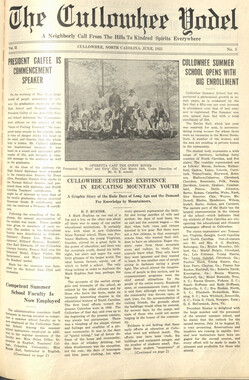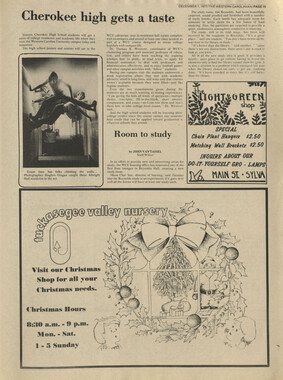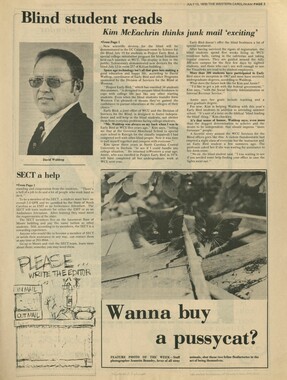Western Carolina University (20)
View all
- Canton Champion Fibre Company (2308)
- Cherokee Traditions (292)
- Civil War in Southern Appalachia (165)
- Craft Revival (1942)
- Great Smoky Mountains - A Park for America (2766)
- Highlights from Western Carolina University (430)
- Horace Kephart (941)
- Journeys Through Jackson (154)
- LGBTQIA+ Archive of Jackson County (85)
- Oral Histories of Western North Carolina (314)
- Picturing Appalachia (6772)
- Stories of Mountain Folk (413)
- Travel Western North Carolina (160)
- Western Carolina University Fine Art Museum Vitreograph Collection (129)
- Western Carolina University Herbarium (92)
- Western Carolina University: Making Memories (708)
- Western Carolina University Publications (2283)
- Western Carolina University Restricted Electronic Theses and Dissertations (146)
- Western North Carolina Regional Maps (71)
- World War II in Southern Appalachia (131)
University of North Carolina Asheville (6)
View all
- Allanstand Cottage Industries (62)
- Appalachian National Park Association (53)
- Bennett, Kelly, 1890-1974 (1388)
- Berry, Walter (76)
- Brasstown Carvers (40)
- Carver, George Washington, 1864?-1943 (26)
- Cathey, Joseph, 1803-1874 (1)
- Champion Fibre Company (233)
- Champion Paper and Fibre Company (297)
- Cherokee Indian Fair Association (16)
- Cherokee Language Program (22)
- Crowe, Amanda (40)
- Edmonston, Thomas Benton, 1842-1907 (7)
- Ensley, A. L. (Abraham Lincoln), 1865-1948 (275)
- Fromer, Irving Rhodes, 1913-1994 (70)
- George Butz (BFS 1907) (46)
- Goodrich, Frances Louisa (120)
- Grant, George Alexander, 1891-1964 (96)
- Heard, Marian Gladys (60)
- Kephart, Calvin, 1883-1969 (15)
- Kephart, Horace, 1862-1931 (313)
- Kephart, Laura, 1862-1954 (39)
- Laney, Gideon Thomas, 1889-1976 (439)
- Masa, George, 1881-1933 (61)
- McElhinney, William Julian, 1896-1953 (44)
- Niggli, Josephina, 1910-1983 (10)
- North Carolina Park Commission (105)
- Osborne, Kezia Stradley (9)
- Owens, Samuel Robert, 1918-1995 (11)
- Penland Weavers and Potters (36)
- Roberts, Vivienne (15)
- Roth, Albert, 1890-1974 (142)
- Schenck, Carl Alwin, 1868-1955 (1)
- Sherrill's Photography Studio (2565)
- Southern Highland Handicraft Guild (127)
- Southern Highlanders, Inc. (71)
- Stalcup, Jesse Bryson (46)
- Stearns, I. K. (213)
- Thompson, James Edward, 1880-1976 (226)
- United States. Indian Arts and Crafts Board (130)
- USFS (683)
- Vance, Zebulon Baird, 1830-1894 (1)
- Weaver, Zebulon, 1872-1948 (58)
- Western Carolina College (230)
- Western Carolina Teachers College (282)
- Western Carolina University (1794)
- Western Carolina University. Mountain Heritage Center (18)
- Whitman, Walt, 1819-1892 (10)
- Wilburn, Hiram Coleman, 1880-1967 (73)
- Williams, Isadora (3)
- Cain, Doreyl Ammons (0)
- Crittenden, Lorraine (0)
- Rhodes, Judy (0)
- Smith, Edward Clark (0)
- Appalachian Region, Southern (2569)
- Asheville (N.C.) (1923)
- Avery County (N.C.) (26)
- Blount County (Tenn.) (161)
- Buncombe County (N.C.) (1672)
- Cherokee County (N.C.) (283)
- Clay County (N.C.) (555)
- Graham County (N.C.) (233)
- Great Smoky Mountains National Park (N.C. and Tenn.) (519)
- Haywood County (N.C.) (3524)
- Henderson County (N.C.) (70)
- Jackson County (N.C.) (4694)
- Knox County (Tenn.) (25)
- Knoxville (Tenn.) (12)
- Lake Santeetlah (N.C.) (10)
- Macon County (N.C.) (420)
- Madison County (N.C.) (212)
- McDowell County (N.C.) (39)
- Mitchell County (N.C.) (132)
- Polk County (N.C.) (35)
- Qualla Boundary (981)
- Rutherford County (N.C.) (76)
- Swain County (N.C.) (2115)
- Transylvania County (N.C.) (270)
- Watauga County (N.C.) (12)
- Waynesville (N.C.) (84)
- Yancey County (N.C.) (72)
- Aerial Photographs (3)
- Aerial Views (60)
- Albums (books) (4)
- Articles (1)
- Artifacts (object Genre) (228)
- Bibliographies (1)
- Biography (general Genre) (2)
- Cards (information Artifacts) (38)
- Clippings (information Artifacts) (191)
- Crafts (art Genres) (622)
- Depictions (visual Works) (21)
- Design Drawings (1)
- Drawings (visual Works) (184)
- Envelopes (73)
- Facsimiles (reproductions) (1)
- Fiction (general Genre) (4)
- Financial Records (12)
- Fliers (printed Matter) (67)
- Glass Plate Negatives (381)
- Guidebooks (2)
- Internegatives (10)
- Interviews (815)
- Land Surveys (102)
- Letters (correspondence) (1013)
- Manuscripts (documents) (618)
- Maps (documents) (177)
- Memorandums (25)
- Minutes (administrative Records) (59)
- Negatives (photographs) (5835)
- Newsletters (1285)
- Newspapers (2)
- Occupation Currency (1)
- Paintings (visual Works) (1)
- Pen And Ink Drawings (1)
- Periodicals (193)
- Personal Narratives (10)
- Photographs (12976)
- Plans (maps) (1)
- Poetry (6)
- Portraits (4533)
- Postcards (329)
- Programs (documents) (151)
- Publications (documents) (2236)
- Questionnaires (65)
- Scrapbooks (282)
- Sheet Music (2)
- Slides (photographs) (402)
- Songs (musical Compositions) (2)
- Sound Recordings (796)
- Specimens (92)
- Speeches (documents) (15)
- Tintypes (photographs) (8)
- Transcripts (322)
- Video Recordings (physical Artifacts) (23)
- Vitreographs (129)
- Text Messages (0)
- A.L. Ensley Collection (275)
- Appalachian Industrial School Records (7)
- Appalachian National Park Association Records (336)
- Axley-Meroney Collection (2)
- Bayard Wootten Photograph Collection (20)
- Bethel Rural Community Organization Collection (7)
- Blumer Collection (5)
- C.W. Slagle Collection (20)
- Canton Area Historical Museum (2110)
- Carlos C. Campbell Collection (282)
- Cataloochee History Project (64)
- Cherokee Studies Collection (4)
- Daisy Dame Photograph Album (5)
- Daniel Boone VI Collection (1)
- Doris Ulmann Photograph Collection (112)
- Elizabeth H. Lasley Collection (1)
- Elizabeth Woolworth Szold Fleharty Collection (4)
- Frank Fry Collection (95)
- George Masa Collection (173)
- Gideon Laney Collection (452)
- Hazel Scarborough Collection (2)
- Hiram C. Wilburn Papers (28)
- Historic Photographs Collection (236)
- Horace Kephart Collection (861)
- Humbard Collection (33)
- Hunter and Weaver Families Collection (1)
- I. D. Blumenthal Collection (4)
- Isadora Williams Collection (4)
- Jesse Bryson Stalcup Collection (47)
- Jim Thompson Collection (224)
- John B. Battle Collection (7)
- John C. Campbell Folk School Records (80)
- John Parris Collection (6)
- Judaculla Rock project (2)
- Kelly Bennett Collection (1407)
- Love Family Papers (11)
- Major Wiley Parris Civil War Letters (3)
- Map Collection (12)
- McFee-Misemer Civil War Letters (34)
- Mountain Heritage Center Collection (4)
- Norburn - Robertson - Thomson Families Collection (44)
- Pauline Hood Collection (7)
- Pre-Guild Collection (2)
- Qualla Arts and Crafts Mutual Collection (12)
- R.A. Romanes Collection (681)
- Rosser H. Taylor Collection (1)
- Samuel Robert Owens Collection (94)
- Sara Madison Collection (144)
- Sherrill Studio Photo Collection (2558)
- Smoky Mountains Hiking Club Collection (616)
- Stories of Mountain Folk - Radio Programs (374)
- The Reporter, Western Carolina University (510)
- Venoy and Elizabeth Reed Collection (16)
- WCU Gender and Sexuality Oral History Project (32)
- WCU Mountain Heritage Center Oral Histories (25)
- WCU Oral History Collection - Mountain People, Mountain Lives (71)
- WCU Students Newspapers Collection (1744)
- Western North Carolina Tomorrow Black Oral History Project (69)
- William Williams Stringfield Collection (2)
- Zebulon Weaver Collection (109)
- African Americans (390)
- Appalachian Trail (35)
- Artisans (521)
- Cherokee art (84)
- Cherokee artists -- North Carolina (10)
- Cherokee language (21)
- Cherokee pottery (101)
- Cherokee women (208)
- Church buildings (170)
- Civilian Conservation Corps (U.S.) (110)
- College student newspapers and periodicals (1830)
- Dams (107)
- Dance (1023)
- Education (222)
- Floods (61)
- Folk music (1015)
- Forced removal, 1813-1903 (2)
- Forest conservation (220)
- Forests and forestry (1184)
- Gender nonconformity (4)
- Great Smoky Mountains National Park (N.C. and Tenn.) (181)
- Hunting (38)
- Landscape photography (25)
- Logging (118)
- Maps (83)
- Mines and mineral resources (8)
- North Carolina -- Maps (18)
- Paper industry (38)
- Postcards (255)
- Pottery (135)
- Railroad trains (71)
- Rural electrification -- North Carolina, Western (3)
- School integration -- Southern States (2)
- Segregation -- North Carolina, Western (5)
- Slavery (5)
- Sports (452)
- Storytelling (244)
- Waterfalls -- Great Smoky Mountains (N.C. and Tenn.) (66)
- Weaving -- Appalachian Region, Southern (280)
- Wood-carving -- Appalachian Region, Southern (328)
- World War, 1939-1945 (173)
Western Carolinian Volume 52 Number 21
Item
Item’s are ‘child’ level descriptions to ‘parent’ objects, (e.g. one page of a whole book).
-
-
The Western Carolinigry0 Thursday, March 26, 1987 People In The News In Triplicate Barry R. McClure, Angela Marie Nations, and Caroline W. Turley have been awarded Congressional Teacher Scholarships by the Board of Directors of the North Carolina State Education Assistance Authority. Each of the scholarships are worth $5,000. Barry McClure, the 1986 winner of the Mary Morrow Teaching Scholarship, is a 1983 graduate of Hayesville High School as well an honor student at WCU. Barry is a member of Kappa Delta Pi, Phi Kappa Phi, Mortar Board, and the Student North Carolina Association of Educators. Angela Nations is an early childhood/ intermediate education major at_WCU. Currently a member of Alpha Lambda Delta, Kappa Delta Pi, and Phi Kappa Phi, Angela is a 1984 graduate of Sylva- Webster High School. Caroline Turley is an English major from Schenectady, NY. who currently resides in Franklin, N.C. Besides serving as an apprentice teacher in the Intensive French Program, Caroline is a member of the Dean's Advisory Committee, Phi Kappa Phi, and SNCAE. carame tuney Webster's Journal Associate Professor of management and marketing at WCU, Francis M. Webster, has been named to the post of editor-in-chief of Project Management Journal. PMJ is the international magazine of Project Management Institute of Drexel Hill, Pennsylvania. Webster replaces Terry L. Kinnear, also an associate professor of management and marketing at WCU, who was editor-in-chief from 1982 til last December. PMJ is produced at WCU's School of Business five times a year and is distributed throughout the United States andin twenty countries. The Project Management Institute is and international organization founded in 1969 to advance professionalism in the field of project management. The editorial responsiblity was given to Western Carolina University five years ago. Cadet Coggins To Europe The Department of Military Science announced this week that Cadet Jacqueline Coggins, of Sylva, has been selected to spend five weeks of her six week Reserve Officer Training Corps Advance Camp working in an U.S. Army Hospital located in Germany. Ms. Coggins first week of training, 5-13 June will take place at Ca mp Perry, which is located in Ohio. This will consist of training which is centered around basic military skills such as land navigation, physical training, and weapons familiarity. Shethen leaves for Germany on the 14th and will return to the states on the 18th of July. LTC Carter, the Professor of Military Science here at WCU indicated that there are only 20 ROTC nursing students, out of more than 250, selected to spend part of their summer in Europe, and that he was extremely pleased with Cadet Coggins' selection for this opportunity. Colonel Carter states that Cadet Coggins is an outstanding student, and that her selection to work in Germany this summer was well deserved. Allen Returns Counselor's Corner Accepting Yourself Lsvarrw Hamlin Allen It's had been nearly 30 years since Leverne Hamlin Allen had been to Cullowhee and Western Carolina University. But both times have been quite memorable for her. In the summer of 1957, Ms Allen became the first black student ever enrolled at Western Carolina University. Since then, she has gone on to become a speech pathologist in the Washinaton D.C. area. lS weekend she returned to Western to take part in the first annual Black Alumni Reunion Weekend Her foremost reactiorv-"! wouldn t have En the place if the signs hadn't been there." We all have expectations for ourselves, and most of us are disappointed if we don't fulfill them. One of the buzz-words in psychological jargon for our personal degree of self-acceptance is "self- esteem". The concept "self-esteem" is employed in so many different contexts, that it becomes fuzzy and frequently is reified to imply something that one does or does not have. Counseling Specialist Helen Spear provides a definition that I find most helpful: "Self-esteem is our ability to know ourselves - our strengths and limitations - and to be able to accept and value ourselves unconditionally." The essential element is unconditional acceptance. This implies that regard for yourself doesn't fluctuate according to your most recent test score or the quality of your love life. Perhaps you would like to be more sociable, lose weight, or do better in biology -you can pursue these goals without a concomitant loss of self-esteem. This distinction suggests a difference between an individual evaluating his or her behavior vs. evaluating his/herself. For a moment, entertain the idea that you can be dissatisfied with some of your behaviors and still like yourself. One of the things that helps me to apply the above notion is thinking about my friend Gwen. Gwen can be breathtakingly blunt. She doesn't tell me what I wantto hear; she"callsthemlikeshesees them." Sometimes it can be quite painful when it is my behavior, ideas, or appearance being appraised. However, I greatly value Gwen and her opinion, because I know it is honest. I don't always like what she has to say, but I like her. I try to grant myself the same kind of acceptance I so readily apply to Gwen. I may not always like my performance or the conduct of my life, but I like me for living it. A critical element of self-esteem is the self-talk we provide ourselves. What one says to one's self is the most accessible factor an individual has in monitoring or changing his level of self-esteem. What kinds of things do you say to yourself to keep from feeling good about yourself? Most of us have a tendency to ruminate on our failures and embarrassments. In our mind we replay awkward situations and faux pas in graphic detail and over- generalize about their consequences. Afailureona particular test becomes an "I'm stupid" or "I'll never make it" inner dialogue. A refusal for a date may lead to a belief that "I'm unattractive". The irrational generalizations and assumptions we may make about specific events can be consciously changed and will affect the way we feel about ourselves. Most of us are a storehouse of memories of our blunders. We will retain these memories even though others have forgotten or may never have noticed our difficulties. Learn from these experiences but avoid punishing yourself or replaying negative thoughts or images. Self-talk is one component of what may be symbolized as a self-esteem cycle. In this cycle beliefs lead to self-talk to feelings to behavior in a cyclical pattern: 1.Beliefs 2.Self-talk 3.Feelings 4.Behaviors Actions Self-Esteem Cycle For example, a person believes that she gets along well in social situations. When invited to a party, her self-talk will focus upon the positive aspect of the party - getting to meet new people, seeing old friends, etc. This type of self-talk will lead to positive feelings about attending the party, and the feelings will influence the behavior of the person as she attend the party. Negative beliefs can also affect behavior in a way that can produce negative outcomes. In this case, a person's belief may be that he is unsuccessful at parties. When this person is invited to a party, he may focus on his perceived inadequacy in social situations. The resulting feelings may be ones of dread and anxiety. These feelings can lead to behavior at the party which will confirm fhe accuracy of the original belief or even keep the person from attending the party. In addition to changing his self-talk, an individual can alter this cycle by changing his behavior. A person who has avoided parties in the past may set a goal to attend the party and meet two new people. It appears to be easier to change either behavior and/or self-talk than to change beliefs or feelings. Usually changes in beliefs of feelings will result from changes in behavior or self- talk. Our self-esteem is often influenced by the degree of congruence between our personal values and our behavior. Most of us can be highly self-punishing when we fail to live up to our deeply- held values or standards of how we should behave. It is undeniably important to have some kind of personal values and desirable to have these guide on actions. For our behavior to reflect these values - most of the time - is probably within our grasp. To strive for utter perfection is undoubtedly self- defeating. Recognize when you are allowing your thoughts to lower self-esteem. I believe there is a critical difference between thinking about an action that would lower self-esteem and actually doing it. All of us have thoughts which violate our values, and which we consider inappropriate. I've never known anyone who was successful in totally blocking out these thoughts. Feelings such as love, anger.sexual attraction, fear, shyness, sexual arousal, etc. occur without any conscious effort on the part of the individual. These feelings come almost automatically in response to some situations (even ex-President Carter lusted in his heart). What we do as a result of these feelings is the only thing for which we must take responsibility. Try to live according to your values - most of the time - and avoid self- punishment for temporary set-backs. Mikhail Gorbachev's Second Year At the Helm By ERIN MILLNER NEWS EDITOR An appraisal of Mikhail Gorbachev's guiding of the Soviet Union was the subject of the symposium held March 19 in the Mountain Heritage Center Auditorium. The symposium was a joint undertaking of Pi Gamma Mu.the Student Association for Government and Legal Affairs and WCU's Department of Political Science and Public Affairs. It was apparent that the subject of this symposium was one of interest to WCU's students and faculty as well as members of the local community by the number of persons who attended this presentation. One interesting fact concerning this symposium and many previous ones presented on political matters is that WCU is becoming a university where students not only participate but are involved in organizing these conferences. Presenters for the symposium were Lee Cheek, a graduate student enrolled in WCU's MGA program in the department of Political Science and Dr. Cliff Lovin of the History department. Dr. Don Livingston and Professor Latimer, both of the Political Science departments added their comments on Gorbachev's second year at the helm as discussants in the presentation. The speakers provided an analytic view of Gorbachev's two year administration and n historical view of his rise through the Soviet political machine. As to an appraisal of Gorbachev's accomplishments as a Soviet leader, it was the consensus of the symposium that the leader has only begun to build the power base necessary to gain the support needed for his administration to succeed. The panelist viewed Gorbachev's policies which have been touted as radical to Soviet politics as merely cosmetic changes. Most all of the parties involved in this symposium pointed out that Gorbachev does not yet have the support of Soviet political fractions, and that Gorbachev as a leader faces many obstacles within his country. It was pointed out that Gorbachev has yet to overcome the economic problems that plague the Soviet Union as well as the Afghanistan situation. Those achievements which are credited to Gorbachev's reign, such as his "glasnost" policy, his releasing of a dissidents, and his goals of arms reductions were not viewed as glowing accomplishments by the panelist. The terms "cosmetic" and "propaganda" were tossed freely as descriptions of these policies. Obviously, it was the opinion of these scholars that it is far to early to discern the direction Gorbachev's administration will take and whether it will be successful. ring oX FANTASTIC HAIRSTYLING STUDIO Presents Men's Special U SHAMPOO/CUT S WITH HOT *: FACIAL AND *• NECK MASSAGE •S PRICE $18"° Fa\e Taylor-Owner Walk Ins Welcome MON.-FRI. 9-6 SAT. 9-4 P.M. Next Door to Quick Stop hair Care Products (7041 293-3125 FROM THE ALPS TO THE APPALACHIANS, FROM SALSBURG TOSYLVA - The von Trapp children from "The Sound ot Music" will come to life again next week, but this time with a distinctly local flavor. Seven area residents have been cast in the von Trapp roles for the April 2 and 3 performances of" The Sound of Music" at WCU. Singing, dancing, and starring will be Jenny Watson ot Clyde (front) as 4-year-old Gretl; Amber Homolka. Ashley Trull and Logan McGuire. all ot Sylva (left-to-right, center), as 7-year-old Maria. 9- year-old Brigitta and 10-year-old Kurt, respectively: and Will Hipps ot Waynesville. Anita Knight of Balsam and Michele Plexico ot Waynesville. as 14-year-old Freidrich, 16-year-old Liesl and 13- year-old Louisa. (WCU Photo by Mark Haskett) / 71 EXPERIENCE IT CO-OP YOU EARN A FUTURE WHEN YOU EARN A DEGREE [ /=5, Co-op experience makes a diffrence. A recent North Carolina State survey indicates that graduates with co-op experience are more likley to be employed full time and less likely to be unemployed.Beginning salaries were also higher for co-op graduates than non co-op graduates. To find out more about your co-opportunities contact the Co-op office in 6 Mckee Building Phone: 227-7133
Object
Object’s are ‘parent’ level descriptions to ‘children’ items, (e.g. a book with pages).
-
The Western Carolinian is Western Carolina University's student-run newspaper. The paper was published as the Cullowhee Yodel from 1924 to 1931 before changing its name to The Western Carolinian in 1933.
-
